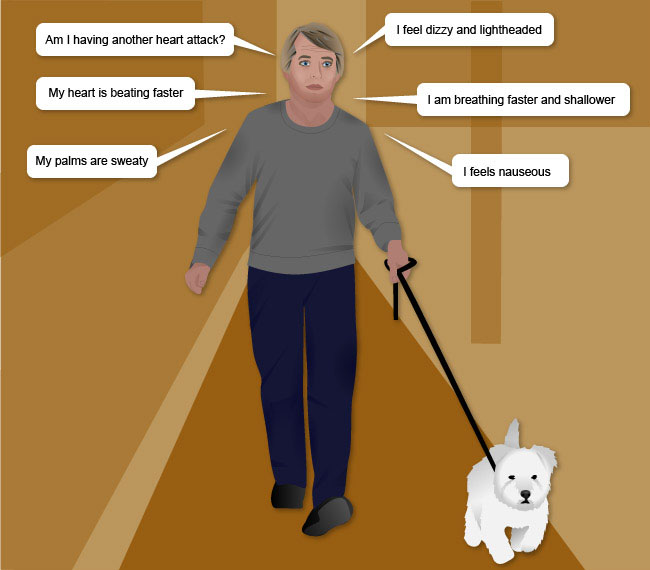Angus is admitted for a 3rd time to Accident & Emergency, due to chest pain and breathlessness, but is discharged home as medical staff feel his symptoms are anxiety related. However, A&E staff referred him to the cardiac rehabilitation team for early review. Angus is reviewed by a member if the cardiac rehabilitation team. He is assessed using the HADS screening tool which confirms that Angus has high levels of anxiety.

Whilst Angus is out walking his dog his thoughts include:
- “Am I having another heart attack?”
- “I feel dizzy and lightheaded”
- “My heart is beating faster”
- “I am breathing faster and shallower”
- “I have a funny tingling feeling all over my body.”
- “I feel nauseous”
- “I feel like I am going to die!”
It is possible that Angus is suffering from panic-like anxiety. The symptoms of panic can very convincingly mimic symptoms of myocardial infarctions. However, there are minor differences.
| Symptom | Pain |
|---|---|
| Panic Attack |
|
| Myocardial Infarction |
|
Panic-like anxiety (panic attacks with or without panic disorder) is the most prevalent condition associated with unexplained chest pain in the emergency department. This is a highly treatable condition which may be responsible for a significant portion of the negative consequences of unexplained chest pain, such as functional limitations and chronicity. However, more than 92% of panic-like anxiety cases remain undiagnosed at the time of discharge from the emergency department. (Foldes-Busque, G., Denis, I., Poitras, J., Fleet, R., Archambault, P., Dionne, C., 2013.)
Please enable JavaScript in your browser to see this interactive content.
Angus’ speech bubbles whilst walking the dog
“Am I having another heart attack?”
“My heart is beating faster.”
“My palms are sweaty.”
“I feel dizzy and lightheaded.”
“I am breathing faster and shallower.”
“I feel nauseous.”
Missed Opportunities
Cardiac Ward staff: did not ensure that Angus was adequately informed and reassured prior to discharge.
Practice Nurse: asked Angus how he was feeling but did not fully assess his feelings or issues.
General Practitioner: recognised that Angus was having problems sleeping but did not fully explore the reasons for this.
Accident & Emergency staff: although Angus was admitted twice following his MI and he was thought to be anxious he was not formally screened for this.
Pulse point
Given the incidence and prevalence of anxiety and depression in individuals with cardiac disease, it is important that ALL cardiac patients are screened for signs of these, using the screening tools recommended in this module. Healthcare staff had a number of opportunities to assess Angus, so that he could be supported to manage his anxiety, but these opportunities were missed.
Page last reviewed: 25 Sep 2020


